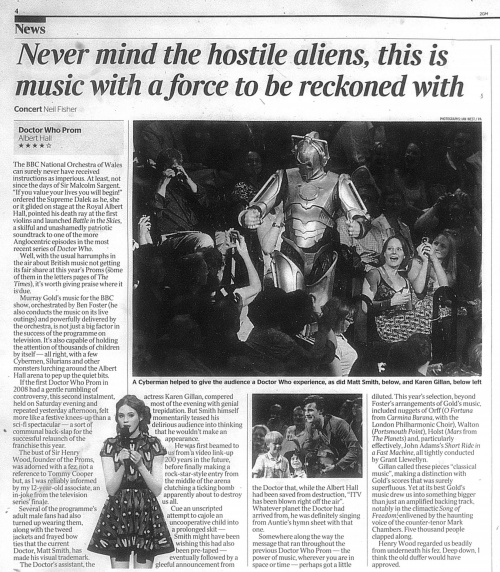Never mind the hostile aliens, this is music with a force to be reckoned with
- Publication: The Times
- Date: 2010-07-26
- Author: Neil Fisher
- Page: 4
- Language: English
Doctor Who Prom
Albert Hall
★★★★☆
The BBC National Orchestra of Wales can surely never have received instructions as imperious. At least, not since the days of Sir Malcolm Sargent. "If you value your lives you will begin!" ordered the Supreme Dalek as he, she or it glided on stage at the Royal Albert Hall, pointed his death ray at the first violins and launched Battle in the Skies, a skilful and unashamedly patriotic soundtrack to one of the more Anglocentric episodes in the most recent series of Doctor Who.
Well, with the usual harrumphs in the air about British music not getting its fair share at this year's Proms (some of them in the letters pages of The Times), it's worth giving praise where it is due.
Murray Gold's music for the BBC show, orchestrated by Ben Foster (he also conducts the music on its live outings) and powerfully delivered by the orchestra, is not just a big factor in the success of the programme on television. It's also capable of holding the attention of thousands of children by itself— all right, with a few Cybermen, Silurians and other monsters lurching around the Albert Hall arena to pep up the quiet bits.
If the first Doctor Who Prom in 2008 had a gentle rumbling of controversy, this second instalment, held on Saturday evening and repeated yesterday afternoon, felt more like a festive knees-up than a sci-fi spectacular — a sort of communal back-slap for the successful relaunch of the franchise this year.
The bust of Sir Henry Wood, founder of the Proms, was adorned with a fez not a reference to Tommy Cooper but, as I was reliably informed by my 12-year-old associate, an in-joke from the television series' finale.
Several of the programme's adult male fans had also turned up wearing them, along with the tweed jackets and frayed bow ties that the current Doctor, Matt Smith, has made his visual trademark.
The Doctor's assistant, the actress Karen Gillan, compered most of the evening with genial trepidation. But Smith himself momentarily teased his delirious audience into thinking that he wouldn't make an appearance.
He was first beamed to us from a video link-up 200 years in the future, before finally making a rock-star-style entry from the middle of the arena clutching a ticking bomb apparently about to destroy us all.
Cue an unscripted attempt to cajole an uncooperative child into a prolonged skit — Smith might have been wishing this had also been pre-taped — eventually followed by a gleeful announcement from the Doctor that, while the Albert Hall had been saved from destruction, "ITV has been blown right off the air". Whatever planet the Doctor had arrived from, he was definitely singing from Auntie's hymn sheet with that one.
Somewhere along the way the message that ran throughout the previous Doctor Who Prom — the power of music, wherever you are in space or time — perhaps got a little diluted. This year's selection, beyond Foster's arrangements of Gold's music, included nuggets of Orff (O Fortuna from Carmina Burana, with the London Philharmonic Choir), Walton (Portsmouth Point), Hoist (Mars from The Planets) and, particularly effectively, John Adams's Short Ride in a Fast Machine, all tightly conducted by Grant Llewellyn.
Gillan called these pieces "classical music", making a distinction with Gold's scores that was surely superfluous. Yet at its best Gold's music drew us into something bigger than just an amplified backing track, notably in the climactic Song of Freedom enlivened by the haunting voice of the counter-tenor Mark Chambers. Five thousand people clapped along.
Henry Wood regarded us beadily from underneath his fez. Deep down, I think the old duffer would have approved.
Caption: A Cyberman helped to give the audience a Doctor Who experience, as did Matt Smith, below, and Karen Gillan, below left
Disclaimer: These citations are created on-the-fly using primitive parsing techniques. You should double-check all citations. Send feedback to whovian@cuttingsarchive.org
- APA 6th ed.: Fisher, Neil (2010-07-26). Never mind the hostile aliens, this is music with a force to be reckoned with. The Times p. 4.
- MLA 7th ed.: Fisher, Neil. "Never mind the hostile aliens, this is music with a force to be reckoned with." The Times [add city] 2010-07-26, 4. Print.
- Chicago 15th ed.: Fisher, Neil. "Never mind the hostile aliens, this is music with a force to be reckoned with." The Times, edition, sec., 2010-07-26
- Turabian: Fisher, Neil. "Never mind the hostile aliens, this is music with a force to be reckoned with." The Times, 2010-07-26, section, 4 edition.
- Wikipedia (this article): <ref>{{cite news| title=Never mind the hostile aliens, this is music with a force to be reckoned with | url=http://cuttingsarchive.org/index.php/Never_mind_the_hostile_aliens,_this_is_music_with_a_force_to_be_reckoned_with | work=The Times | pages=4 | date=2010-07-26 | via=Doctor Who Cuttings Archive | accessdate=16 April 2024 }}</ref>
- Wikipedia (this page): <ref>{{cite web | title=Never mind the hostile aliens, this is music with a force to be reckoned with | url=http://cuttingsarchive.org/index.php/Never_mind_the_hostile_aliens,_this_is_music_with_a_force_to_be_reckoned_with | work=Doctor Who Cuttings Archive | accessdate=16 April 2024}}</ref>
